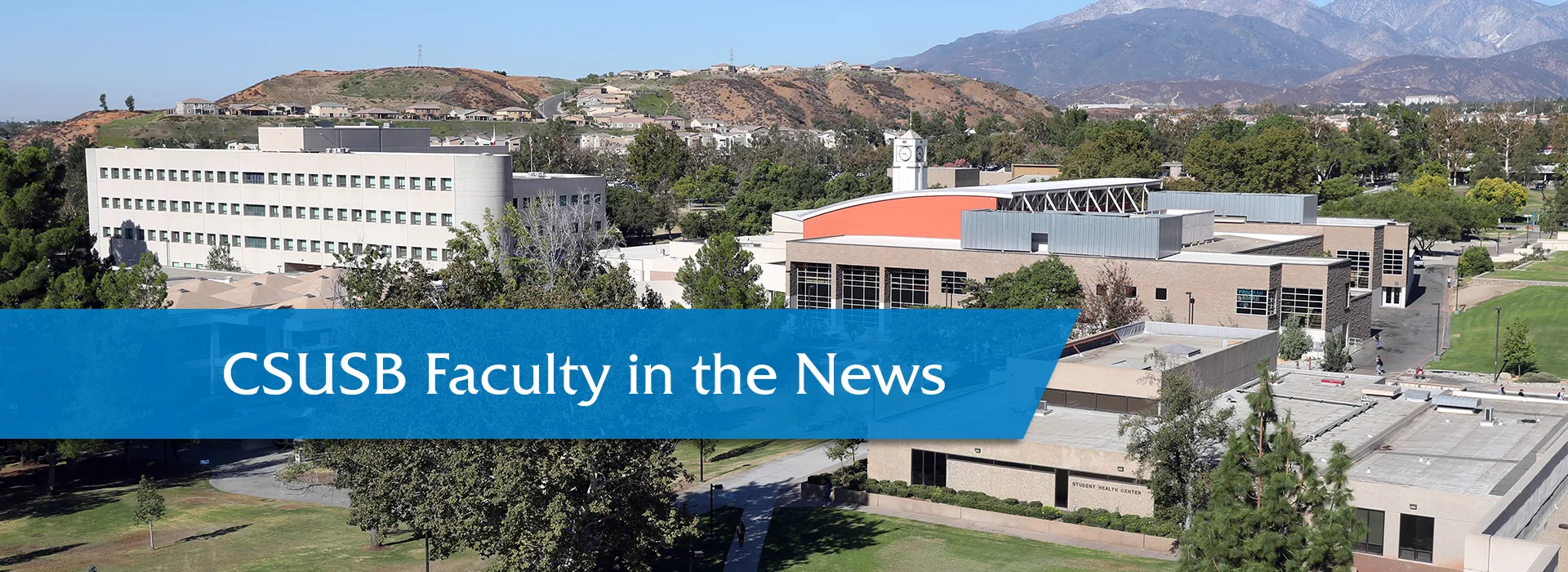NOTE: Faculty, if you are interviewed and quoted by news media, or if your work has been cited, and you have an online link to the article or video, please let us know. Contact us at news@csusb.edu.
Mentoring undergraduate research through CSUSB’s South Africa Study Abroad ProgramPerspectives on Undergraduate Research and MentoringOctober 2018CSUSB faculty Kelly Campbell (psychology) and Tiffany Jones (history) published an article in the academic journal published by Elon University about the university’s study abroad program in South Africa. From the journal’s abstract: “This paper describes the challenges and opportunities associated with implementing a research-centered, short-term study abroad program in South Africa. The faculty directors represent the fields of History and Psychology, and discuss their experiences mentoring undergraduate students in the program. Student quotes are incorporated throughout to highlight their perspectives.” Read the complete article at “Mentoring undergraduate research through a South Africa Study Abroad Program.”
Literary award earned by CSUSB faculty listed in articleThe Press-EnterpriseOct. 31, 2018 In an article about the latest honor a member of the Inlandia Institute has earned, the newspaper mentioned that poet Juan Delgado and photographer/author Thomas McGovern, both Cal State San Bernardino professors, received the American Book Award for their book “Vital Signs” in 2014. The book documents the cultural urban landscape of the city of San Bernardino in photographs and reflections. Read the complete article at “UC Riverside professor’s American Book Award could boost other Inland authors.”
Attempts to ban extremists from the social media pushes them elsewhere, CSUSB professor saysVice NewsOct. 31, 2018 The online news site, in an article about the controversial social media site Gab, interviewed Brian Levin, director of the Center for the Study of Hate and Extremism at California State University at San Bernardino, for his thoughts to the moves to essentially block the site. “We’re kicking the fire-starters out of our house, and they’re all moving next door to a smaller house, where they’re bringing all their gasoline, matches, and hatred,” said Levin. “So there’s always a risk when that house next door goes up.” Just days after a lone gunman opened fire and killed 11 people at a synagogue in Pittsburgh, Gab was gone, Vice News reported. Tech giants GoDaddy and PayPal pulled the plug on the site as soon as public scrutiny zeroed in on the shooter's account, where he regularly shared violently racist and anti-Semitic content. Displacing an online haven for extremists with an estimated 500,000 global users would, in theory, be a massive blow for the far right. Except just as Silicon Valley was cutting ties with Gab, another site, called “FreeZoxee,” joined the far-right online galaxy and rolled out the red carpet for “Gabfugees.” Read the complete article at “Kicking Gab off the internet won’t kill online extremism. It may make it worse.”
Work of CSUSB professor cited in article about increases in hate crimesThe Washington PostOct. 31, 2018 The work of Brian Levin, director of the Center for the Study of Hate and Extremism at California State University at San Bernardino, was cited in an article about academic researchers charting “how hate crimes, which have been rising overall, have increasingly gone from sadistic quests to inflict pain on members of minority groups to violence used as an angry defense against rapid social and demographic changes.” Levin and the CSUSB center has reported similar spikes as West Virginia University hate crime researcher James Nolan after threatening events, the newspaper reported, including 9/11, passage of the same-sex marriage law, the election of President Barack Obama and the surge in the unemployment rate. He tallied 1,037 hate crimes in 2016, an increase of more than 23 percent over the previous year in the nine areas he researched. Read the complete article at “‘Saviors of the white race’: Perpetrators of hate crimes see themselves as heroes, researchers say.”
These news clips and others may be found at “In the Headlines” at inside.csusb.edu.
